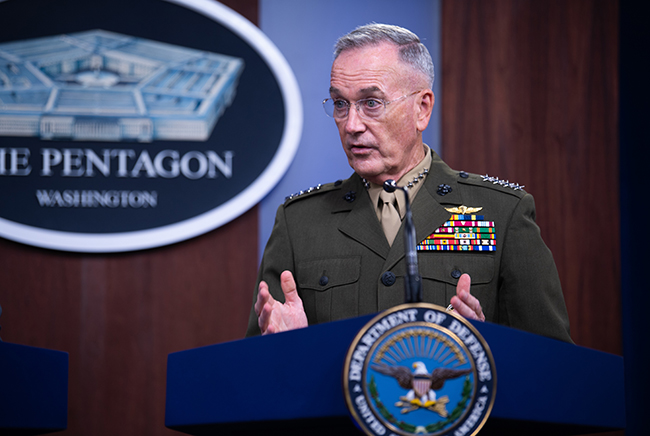
Chairman of the Joint Chiefs of Staff Gen. Joseph Dunford speaks to members of the press during his first joint press conference with Defense Secretary Mark Esper at the Pentagon on Aug. 28, 2019. Defense Department photo by SSgt. Nicole Mejia.
The Pentagon is focusing on ways to ensure stability in Afghanistan as the US and Taliban negotiate a peace process and the State Department calls for a way to bring US forces home.
“I’m not using the ‘withdraw’ word right now,” Chairman of the Joint Chiefs Gen. Joseph Dunford told reporters during an Aug. 28 briefing at the Pentagon. “We’re going to make sure that Afghanistan’s not a sanctuary, and we’re going to have an effort to bring peace and stability in Afghanistan.”
Secretary of State Mike Pompeo, speaking at an American Legion convention on Aug. 27, was more direct on the issue of withdrawing US troops. “We want to get our folks home as fast and in as large numbers as we can, and we want to make sure that never again is terror struck on the United States from that soil,” Pompeo said of the ongoing discussions with the Taliban.
Dunford acknowledged that the White House wants to ensure that “our counterterrorism objectives are addressed” alongside a peace settlement for the war-torn nation. He did not speculate on what the future US presence in the country could look like after about two decades of war.
“We have tailored our counterterrorism presence in Afghanistan to reflect the operational environment,” Dunford said. “The operational environment would clearly change in the wake of a negotiation, but I think we’d have to make assessments.”
Despite US-Taliban negotiations, which are reportedly close to reaching a deal, violence continues to plague Afghanistan. So far this year, more US service members have been killed in the country than in all of 2018, and American aircraft conducted 3,700 strikes in 2019 as of the end of July. Without a big change, Afghan troops will actively need US support for the foreseeable future, Dunford said.
“Could we talk conceptually about a time in the future when the Afghan Security Forces can deal with security in their country by themselves? You can,” he said. “But we’re not prepared to have a specific conversation about when that may be or what capability would be associated with what operating environment.”
“In the current environment at the level of violence associated with the insurgency, I think we and the Afghans agree that some degree of support is necessary,” he added. “That’s why we have forces on the ground inside of Afghanistan today.”
Defense Secretary Mark Esper, speaking alongside Dunford, said the potential political pact is realistic. “We’re on that path right now, and we’re hopeful that we can reach some type of conclusion that would result in a political agreement that can get us on the right trajectory,” he said.
Any agreement reached with the Taliban on the future of the war will have to be based on how conditions on the ground evolve, Esper said.
“What is needed is some type of disruption to the status quo,” he said. “I think an agreement that can initiate inter-Afghan dialogue potentially leading to a reduction of violence associated with the insurgency is something that’s worth trying.”